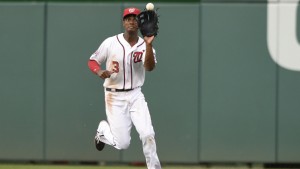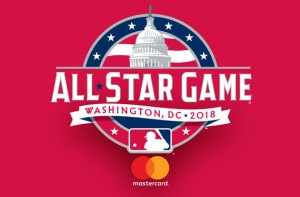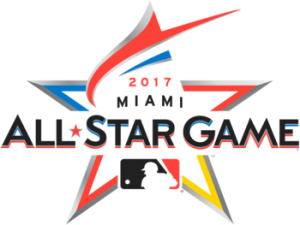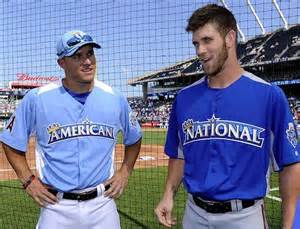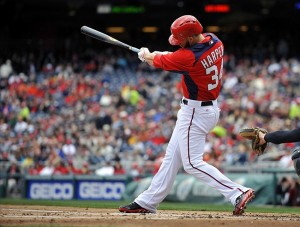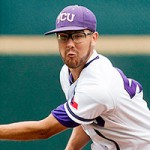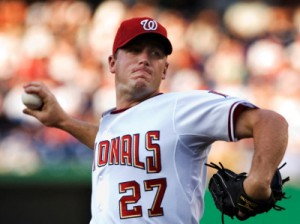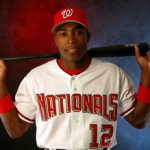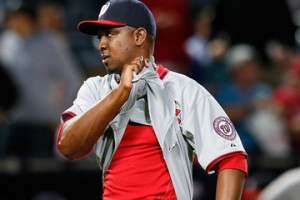
Will Soriano join the Nats to Oblivion list? Photo via zimbio.com
Note: this is a recurring post, and large chunks of the older material is recycled. I’ve updated the research for older players as needed. See here for 2013’s version, click here for 2012’s version of this post.
Several years ago (November 2010) Mark Zuckerman posted a fascinating analysis he titled “From Nats to Oblivion.” It chronicled the astoundingly high number of players that the early incarnations of the Nats were using who, once the Nats released them, never again appeared in a MLB game. I thought the analysis was so interesting that I kept up the same data and have been keeping it up-to-date with the whereabouts of Nats-to-Oblivion candidates ever since. So with apologies to Zuckerman for stealing his idea, here’s an interesting visit to the Nats darker past.
It is nearly impossible for a team to field an entire year’s worth of players who will not fall into this “Oblivion” category. Every MLB team has guys playing out the string or near retirement, and every MLB team calls up guys through out the season from the minors who eventually show themselves as unable to compete on the MLB level and who never make it back. So a 0% oblivion measure isn’t a goal. The best this team has done is 5 players (the 2012 and 2013 teams), but the 2014 team has a good shot of beating that.
For your reminiscing pleasure, here is the summary data updated to the 2014 team:
- 2014: 22 position, 18 pitchers, 40 total. 8/40 = 20% candidate ratio right now
- 2013: 23 position, 21 pitchers, 44 total. 5/44 = 11.3% candidate ratio
- 2012: 24 position, 19 pitchers, 43 total. 5/43 = 11.6% candidate ratio
- 2011: 20 position, 24 pitchers, 44 total. 6/44 = 13.6% candidate ratio
- 2010: 20 position, 26 pitchers, 46 total. 12/46 = 26.0% never appeared again
- 2009: 25 position, 30 pitchers, 55 total. 9/55 = 16.3% never appeared again
- 2008: 25 position, 25 pitchers, 50 total. 8/50 = 16% never appeared again
- 2007: 21 position, 26 pitchers, 47 total. 12/47 = 25.5% never appeared again
- 2006: 28 position, 29 pitchers, 57 total. 20/57 = 35% never appeared again
- 2005: 30 position, 25 pitchers, 55 total. 16/55 = 29% never appeared again
Look at the 2006 season; 35% of the players who played for the team that year never played another Major League game. That’s still astounding to me. Read on for a detailed look back at some of the very bad players that have put in significant time for this team.
2014 (8 candidates right now):
Total Players used: 22 position, 18 pitchers, 40 total. 8/40 = 20% candidate ratio right now
Candidates:
- Scott Hairston: FA after 2014, has not yet signed for 2015
- Greg Dobbs: FA after 2014, has not signed yet for 2015
- Nate Schierholtz: FA after 2014, signed w/ Texas but did not stay with club out of spring training.
Currently unsigned Currently in Japan
- Kevin Frandsen; re-signed and released by team in Apr 2015. Signed w/ Arizona Apr 2015, ML deal for AAA
- Ryan Mattheus: Signed with LAA for 2015; in AAA
- Jeff Kobernus:
Nats AAA 2015 Released by the team Mar 2015, unsigned as of this posting.
- Rafael Soriano: FA after 2014, has yet to sign for 2015
- Taylor Hill: Nats AAA 2015
(Note; i’ve put in corrections as noted in the comments, striking out the incorrect text).
I’d expect this list to at least get cut in half; Kobernus and Hill seem likely to get some work with the Nats this year, and its just a matter of time before Soriano gets signed to fill out someone’s bullpen hole (like ours?). The first 5 guys though … could be in trouble. Hairston and Dobbs went the whole off-season w/o getting signed. Schierholz didn’t make the Texas team and is a FA. Frandsen is in the same boat after getting unconditionally released by the Nats, but quickly picked up a AAA deal with Houston. Mattheus is off the 40-man but did make the Angels’ AAA team as a MLFA.
Favorite Nats-to-Oblivion story: too early to have a “story” really. Maybe the story about how Ryan Mattheus‘ career basically cratered after he punched a wall with his pitching hand in May of 2013. Or the story of Rafael Soriano‘s fall from grace in 2014 (first half: 0.97 ERA and talks of an All Star snub. Second half? 6.48 ERA and being removed as closer). But neither of those stories are really “fun.”
2013 (5 Candidates):
Total Players used: 23 position, 21 pitchers, 44 total. 5/44 = 11.3% candidate ratio right now
Current Candidates
- Chad Tracy: MLFA signed w/ LA Angels for spring 2014, cut, retired 4/25/14
- Yunesky Maya; MLFA with Atlanta AAA for 2014, then went to Korea where he is in 2015.
- Chris Marrero: MLFA, signed w/ Baltimore AAA 2014, no stats for 2015 yet.
- Jhonatan Solano; Nats AA 2014, Miami AAA for 2015.
- Erik Davis; Nats AAA 2014 60 day D/L Tommy John surgery 2014, still on Nats D/L 2015
Updates since last post: Removed Nathan Karns (TB), Corey Brown (Boston), Jeff Kobernus (Nats in 2014), Eury Perez (NYY).
At least three of these players may very well stay on the “Oblivion” list (the first three). The last two seem like better candidates to eventually get off the list.
Favorite Nats-to-Oblivion story: Yunesky Maya, who was Mike Rizzo‘s first foray into the Cuban exile market. Signed to a 4yr/$8M deal, he was given several shots at the majors and never could capitalize. He arrived in the US with a wide arsenal of pitches but not a lot of swing-and-miss talent, and he ended up basically being a AAA starter. He spent the last three seasons as Syracuse’s lead starter (getting 22, 28 and 24 starts there in-between infrequent call-ups) and ended up with just one career MLB win for his $8M salary (making his one of the worst dollars-per-win contracts ever … even if it was “just” $8M). This whole paragraph is assuming that Maya never makes it back to the majors … but based on what he’s shown thus far combined with his advancing age, that seems like a likely end-result for the Cuban starter. As we speak, he has given up on minor league ball and has decamped for Korea, where he’s shown some good stats in limited appearances.
2012 (5 candidates)
Total Players used: 24 position, 19 pitchers, 43 total. 5/43 = 11.6% candidate ratio right now
Candidates
- Brad Lidge: Retired post 2012
- Carlos Maldonado: Wash AAA 2013. Not signed for 2014
- Ryan Perry: Wash AAA/AA 2013, 2014, released by Washington in 2014 and no subsequent appearances.
- Jesus Flores; signed ML deal with Los Angeles Dodgers for 2013, was with TB, KC for 2014, not signed for 2015
- Brett Carroll: signed ML deal w/ Pittsburgh for 2013, Tor for 2014. Not signed for 2015
Updates in last 12 months: none; we removed several players from this list last year, but none since.
Favorite Nats-to-Oblivion story: Brad Lidge, who gave it one last shot and failed spectacularly. When you lose your stuff, its gone and gone fast. I’ll readily admit I thought the signing was a great one when it occurred but it just didn’t work out. I really hoped that Lidge would be a serviceable 7th inning guy and mentor to Drew Storen and Tyler Clippard, being one of the great closers of his day. It didn’t work out that way: the Nats released him on June 25th and he hung ’em up.
2011 (6 candidates)
Total Players used: 20 position, 24 pitchers, 44 total. 6/44 = 13.6% candidate ratio right now…
Candidates
- Ivan Rodriguez – retired after 2011; will appear on the 2017 Hall-of-Fame Ballot with 1st ballot stats but a PED cloud over his head.
- Matt Stairs — retired after 2011
- Alex Cora — retired after 2011, now the General Manager of a Puerto Rican Winter League team.
- Cole Kimball — Nats 60-day DL in 2012, XST in 2013, DFA’d off 40-man roster. 2014 indy, NYY AA team
- Brian Broderick — Stl AAA, waived now Nats AAA in 2012, AA in 2013. Indy ball 2014, Kansas City AAA 2015
- Atahualpa Severino — Nats AAA, DFA’d off 40-man in 2012, signed w/ KC for 2013, Atl AAA in 2014, LAA AAA in 2015
Changes in the last 12 months: none.
A couple of these guys are still hanging on; with Broderick coming back to organized ball and Severino with his third straight MLFA signing with a new squad for 2015.
Favorite Nats-to-Oblivion story: Matt Stairs: He made the 2011 roster despite having almost no defensive capabilities and, as it soon became evident, almost no remaining abilities at the plate. He somehow hung onto his roster spot until August 1st despite having just one extra base hit in 74 at-bats on the year. I remember one game in particular; we were at the stadium going against the hated Phillies and they left Roy Halladay in to attempt to finish a shutout with a 3-0 lead (Game was on 4/13/11). Nats rally, score 2 runs to make it 3-2. Stairs comes up pinch hitting for Jerry Hairston with guys on 1st and 2nd with one out; he promptly watches three straight fastballs go right down the middle of the plate without moving his bat. I’ve never been so p*ssed at a player at the ball-park. Fellow Nats-to-Oblivion candidate Ivan Rodriguez then promptly struck out on 3 pitches as well, looking strike 3 into the mitt and then arguing vehemently with the ump over the game-ending call which gave Halladay the complete game victory.
2010 (12 players)
Total Players used: 20 position, 26 pitchers, 46 total. 12/46 = 26.0% never appeared again
Players:
- Kevin Mench; retired after 2010
- Jamie Burke; retired after 2010
- Luis Atilano: in CIN org, AAA in 2012, never signed for 2013, out of baseball.
- Scott Olsen; in CWS org, AAA 2012, never signed for 2013, out of baseball.
- Tyler Walker; indy league 2011, never signed for 2012, out of baseball.
- Matt Chico; indy league 2012, never signed for 2013, out of baseball.
- Garrett Mock: Houston AAA 2012, AZ AAA for 2013. Not signed for 2014
- Jason Bergmann: indy 2011, Col AAA 2012, Indy again in 2013, KC AA. Not signed for 2014
- JD Martin; in MIA org AAA 2012, in TB AAA 2013, in Korea 2014
- Jesse English; indy league 2011, 2012. Mexican League 2013, Indy ball 2014
- Joe Bisenius; in Mexico 2011-12, Atl AA/AAA 2013, indy/mexican league 2014
- Willy Taveras; played AAA for Col in 2011, retired prior to 2012, back with KC AAA 2013. Mexican league 2014, 2015
Changes in last 12 months: none.
As far as I can tell, we’re down to just one player even on a 2015 roster, albeit its Taveras in the Mexican league.
Favorite Nats-to-Oblivion story: Jamie Burke: The 2009 Nats were so thin at Catcher by the end of the season that we literally bought a spare catcher in Burke from Seattle so we could have some coverage at the end of the season. Burke re-signed on for 2010 and appeared in exactly one MLB game. He was released after the season and retired.
2009 (9 players)
Total Players used: 25 position, 30 pitchers, 55 total. 9/55 = 16.3% never appeared again
Players:
- Elijah Dukes: released and never picked up for 2010. Arrested in 2011, 2012, out of baseball.
- Alex Cintron; playing in Mexico 2012, nothing in 2013
- Jorge Padilla; in SD org, AAA in 2012, nothing in 2013
- Ron Villone, AAA all of 2010, 2011 playing indy ball, retired prior to 2012. He was scheduled to appear on the 2015 Hall of Fame ballot but was removed for some reason. Was a pitching coach for the Cubs organization; not sure where he is (if anywhere) for 2015.
- Julian Tavarez; retired after getting DFA’d in July 2009
- Mike Hinckley: Tor org in 2011, retired prior to 2012
- Steven Shell; KC org in 2011, retired prior to 2012
- Victor Garate; MIL org and Indy ball in 2012, Mexican league 2013, 2014. Nowhere for 2015, yet…
- Zack Segovia; in Det org AA in 2012, Mexican league/Indy ball 2013, Mexican League 2014. Nowhere for 2015, yet…
Changes in last 12 months: none.
Still a couple guys active in the Mexican league, possibly, for 2015.
Favorite Nats-to-Oblivion story: Ron Villone, who proved that a crafty lefty with a halfway decent fastball can have a long career in this game. He had 63 appearances at age 39 for the 2009 Nats and got re-signed for 2010. He didn’t make the team though, labored in Syracuse the whole season and was released. Despite being 41 years old, he headed to Indy ball for one last shot but washed out after just a few outings in 2011.
It wouldn’t be a retrospective on poor Nats players if we didn’t briefly talk about Elijah Dukes though. I think its safe to assume that he’s the only guy on this list that has served more time in jail than has played in the minor leagues, attempting to get back to the show.
2008 (8 players)
Total Players used: 25 position, 25 pitchers, 50 total. 8/50 = 16% never appeared again
Players:
- Kory Casto; 2009 AAA, 2010 in Ariz AA, retired.
- Dmitri Young: some rehab in low minors 2009, retired.
- Rob Mackowiak: 2009: some indy, bounced around AAA, that’s it.
- Johnny Estrada; quit after 2008 mid-season release.
- Odalis Perez; refused his 2009 contract, never resigned (see below)
- Levale Speigner; 2009 in Florida’s AA/AAA, then 2010 in Seattle AAA. done.
- Ray King; retired after 2008
- Chris Schroder; 2009, 2010 bounced around AAA with Oakland, Fla.
Changes in last 12 months: none
Favorite Nats-to-Oblivion story: Odalis Perez, though I’m tempted to say either Mackowiak or Estrada, possibly the two worst FA signings of the whole Jim Bowden era (and that’s saying something). But nothing beats the Perez story. He was the Nats Opening Day Starter in 2008, and he was the first guy to get a start in the new Nationals Stadium. He pitched decently enough; in 30 starts he was 7-12 with a 4.34 ERA and a 99 ERA+ for a god-awful team. But apparently he got really pissed when the team only offered him a non-guaranteed Minor League deal for 2009. So he held out, the Nats said “fine with us” and released him, and nobody else picked him up. And he never played another game. I’m not sure if that was a sign that he was just that bad (not one team wanted to even give an opening day starter a look the subsequent year?), or if there was some sort of MLB general manager omerta that conspired against him. Either way, Perez played again, not even in Winter Leagues as far as I could find. Sometimes a player has to swallow his pride, and Perez apparently could not.
2007 (12 players)
Total Players used: 21 position, 26 pitchers, 47 total. 12/47 = 25.5% never appeared again
Players:
- Nook Logan; indy league 2008, 2010.
- Robert Fick: Cut from the Padres in ST 2008, full year indy league 2009, retired.
- D’Angelo Jimenez: AAA all of 2008, 2009. Mexican league and Indy league 2010-2012
- Tony Batista: Wash AAA 2008, then released
- Michael Restovich: 2008 in Japan, AAA 2009-2011, retired
- Brandon Watson: AAA 2008-9, indy league 2011, retired.
- Mike Bacsik: 2008 AAA, 2011 indy league, now a broadcaster.
- Jason Simontacchi; 2008 indy league, 2010 again.
- John Patterson; cut in ST 2008, immediately signed w/ Texas but never played again.
- Ryan Wagner: AAA 2008-9, released and presumably retired.
- Arnie Munoz; went to mexican league, retired > 2010
- Chris Booker: AAA in 2008, then retired/released.
Changes in last 12 months: none
Favorite Nats-to-Oblivion story: Mike Bacsik, who was destined to be a career 4-A guy before Washington picked him up and gave him 20 starts in 2007. Bacsik was on his 6th minor league organization when he arrived in Syracuse and pitched his way up to the major leagues. He was overmatched badly; he had a 5.11 ERA and just a 3.4 K/9 rate. But he did get his moment in the headlines by giving up Barry Bonds‘ 756th career homer one night in San Francisco in August. Contrary to accusations on the topic, I do not believe Bacsik “served up” the homer. If you check the play index, Bonds hit the 7th pitch of the at-bat in a 3-2 count for that homer. Bacsik didn’t purposely give up a homer on the 7th pitch of an at-bat; he just ran out of pitches to show Bonds that weren’t going to get pulverized.
A quick comment though on John Patterson: I remember being absolutely shocked at his release in 2008’s spring training. He was cut on 3/20/08, right in the middle of Spring Training with no warning and having just thrown his Grapefruit innings. He was healthy, recovered from surgery, ready to be the ace of that staff and start showing off the potential that he showed in 2005 (you know, when he 4-hit the Dodgers with 13 punch outs and posted the best Game-Score performance in Nats history). He signed a ML deal with Texas after his release by the Nats, but he couldn’t answer the call and never appeared again, getting released in mid May. I guess his third arm surgery in 7 years just left him unable to compete at any level and he hung ’em up.
2006 (20 players)
Total Players used: 28 position, 29 pitchers, 57 total. 20/57 = 35% never appeared again
- Damian Jackson; dnp 2007, indy league 2008-9
- Bernie Castro: AAA all of 2007, 8 then retired.
- Alex Escobar: Wash minors 2007-8, then retired.
- Brandon Harper: Wash AAA all of 2007, then released/retired.
- Wiki Gonzalez: CWS AAA all of 2007, indy league 2008, retired.
- Henry Mateo: AAA or Indy league 2007-2009, mexican league from 2010-current 2013
- George Lombard: AAA 2007-9, some indy league, retired.
- Mike Vento: 2007 Wash AAA, indy league 2008, back with Syracuse 2009, retired.
- Melvin Dorta; various minor leagues 2007-2010, indy league 2011, retired.
- Luis Matos: AAA 2007, Mexican League 2008-2012. ? 2013
- Pedro Astacio; retired after 2006
- Felix Rodriguez: dnp 2007, indy league 2008-9, retired.
- Zach Day: AAA 2007, briefly A+ 2008, retired.
- Beltran Perez; wash minors AA/AAA 2007-8, released and never played again.
- Joey Eischen; released off of Washington and retired.
- Travis Hughes; AAA in 2007, played in Japan 2008, indy leagues 2009, 2011.
- Ryan Drese: various minor leagues 2007-8, indy league 2009-2010, Baltimore AAA 2011, released/retired.
- Kevin Gryboski: AAA 2007-2008, retired/released.
- Brett Campbell: Wash AA 2007, released/retired.
- Santiago Ramirez: Japan in 2007, Mexican league 2008, indy 2009, retired.
Changes in last 12 months: none
Favorite Nats-to-Oblivion story: Joey Eischen, who bounced around the league in his 20s before settling in Montreal and moving south with the team. He was known to be a “character” in the clubhouse and to give good quotes to reporters (google “Joey Eischen quotes” and you’ll find some of his classics). By 2006 though the years had taken their toll on his shoulder; he had 19 walks in 14 2/3 innings through the end of May had blown his rotator cuff. The team put him on the 60 day D/L and called up Virginia-native Bill Bray. Eischen never got off that D/L; he was released in the off-season and never played again. He has been a pitching coach in the Colorado system since 2010.
2005 (16 players)
Total Players used: 30 position, 25 pitchers, 55 total. 16/55 = 29% never appeared again
Players:
- Carlos Baerga; retired after 2005
- Junior Spivey: bounced around AAA 2006-7, indy ball in 2009, retired.
- Tony Blanco; Nats minor leagues 2006-7, Colorado AA in 2008, in Japan from 2009-present.
- Wil Cordero; released mid 2005, signed on with the NY Mets but never made it out of AAA. Retired after 2005.
- Deivi Cruz; released after 2005, cut from St. Louis 2006 ST, played indy ball, retired.
- Jeffrey Hammonds; retired in June 2005 mid-season.
- J.J. Davis: Traded to Colorado as part of the Preston Wilson deal, sent to Colorado’s AAA, then released after the season and never played again.
- Rick Short; Granted FA after the 2005 season to play in Japan, played there til 2009.
- Kenny Kelly; AAA in 2006 and 2007, released and retired.
- Keith Osik; a backup catcher, got 4 ABs in 2005, released and retired.
- Tyrell Godwin; after just THREE MLB at-bats in 2005, spent all of 2006 and 2007 in AAA, released and retired.
- T.J. Tucker; released after 2005, tried one year of indy ball in 2008, retired.
- Joe Horgan; released after 2005, played one year of AAA with Florida, released, retired.
- Matt White; AAA in 2006-7, Japan 2007-8, tried indy ball in 2010, hung ’em up.
- C.J. Nitkowski; AAA in 2006, then went to Japan 2007-8, Korea 2009-10, back with the Mets AAA team in July 2012. Not signed for 2013
- Antonio Osuna: dnp in 2006, Mexican league 2007-9.
Changes in last 12 months: none
Favorite Nats-to-Oblivion story: Rick Short, who got his MLB debut at the age of 32, after 11 very long seasons in the minors with many different teams. He got a couple of call-ups in June and July to provide cover, and then played out the string after a Sept 1 roster expansion call-up. In that off-season, he returned to Japan (where he’d played one full season prior), and played four more years in the Japanese League and retired in 2009.
Though it merits talking about a couple other guys here. Tony Blanco; he was a rule-5 draftee who the Nats carried the whole of 2005 so they could keep his rights. He was awful; he had a .177 batting average as the 25th guy off the bench. In 2006 he couldn’t even cut it in AA and played most of the year in High-A. After 2007 the Nats summarily released him from their minor league organization altogether. He found his calling though; he signed on in Japan in 2009 at age 27 and continues to play there today. You have to wonder if he may very well earn another MLB shot.
Jeffrey Hammonds was well known to Washington baseball fans by virtue of his pedigree with our northern neighbors in Baltimore; he was a 1st round draft pick in 1992 out of Stanford, broke in with the MLB team the following year and was a role player on the powerhouse Baltimore teams of the mid 1990s. He bounced around the league afterwards though, signing on with the newly relocated Washington franchise for the 2005 debut season but he hung ’em up after a slow start here. He was only 34 when he retired.
